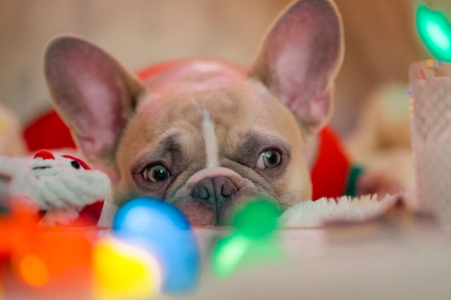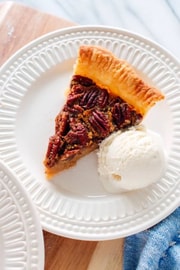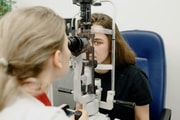The hidden holiday hazards every pet owner should know about
- Replies 0
The holiday season brings a lot of joy—and just as many hidden dangers for the furry family members we love.
From twinkling lights to festive food, pets can find trouble in places we might not expect. What feels like harmless décor or a holiday treat could quickly turn risky if curiosity gets the better of them.
With a few smart precautions, however, the season can stay merry and safe for everyone under the same roof.
Colorado State University’s Dr. Amanda Cavanaugh, an assistant professor and head of the Emergency and Urgent Care Service, says winter tends to shift pet dangers indoors.
“During winter, dogs can get bored inside, and around the holidays, there are new things coming into the house that can prompt naughty behavior,” Cavanaugh said.
“It’s good for pet owners to be extra vigilant this time of year.” She’s seen countless emergencies during December that could have been prevented with a little extra caution around decorations and food.

Among the top issues she warns about are electrical cords, automatic dispensers, and household toxins.
Loose wires from Christmas lights are especially tempting for dogs and cats to chew, and Cavanaugh says the results can be catastrophic.
She also urges owners of smaller pets like rabbits or ferrets to keep cords taped down or hidden under rugs.
Also read: Scammers know you love pets—and they’re using it to trick you
We’ve had pets come in with serious electrocution injuries from something as simple as a string of lights, she explained.
Automatic water dispensers can also become an unexpected hazard for cats left home alone. “Cats can get trapped in a closet or the water bowl can get knocked over,” Cavanaugh said.
“We’ve had some really sick pets that went without water and had high sodium levels that required a lengthy hospital stay.”
She recommends having someone check on pets every 24 hours to ensure they’re safe, hydrated, and not trapped. Even a quick daily visit can make a life-saving difference.
Dr. Cavanaugh also reminds pet owners to plan for emergencies when traveling. If pets must stay behind, she advises letting neighbors or friends know they’re there and leaving a note for firefighters in case of an emergency.
Many rescue crews will prioritize saving animals if they know they’re inside, and having clear information posted can speed up those efforts.
Also read: How AI technology reunites lost pets: The heartwarming story of Simon and his senior owner
A simple sticker or sign on the front door listing your pets can be a small but vital safeguard. When it comes to holiday meals, Cavanaugh says feeding table scraps is one of the most common and dangerous mistakes.
“My vote is just don’t do it,” she warned. “Especially during the holidays when everything is buttery and oily and salty and there’s gravy.”
Foods like turkey, ham, chocolate, raisins, and even certain cookware such as Teflon can cause serious illness in pets, while plants like poinsettias and mistletoe are toxic—though rarely fatal—if ingested.
Read next:

Holidays should be a time for love, not late-night vet visits. A few small precautions can help ensure your pets enjoy the festivities just as much as you do. Remember—safety first, treats second, and always keep an eye out for those curious paws. What steps will you take to keep your furry friends safe this holiday season?
From twinkling lights to festive food, pets can find trouble in places we might not expect. What feels like harmless décor or a holiday treat could quickly turn risky if curiosity gets the better of them.
With a few smart precautions, however, the season can stay merry and safe for everyone under the same roof.
Colorado State University’s Dr. Amanda Cavanaugh, an assistant professor and head of the Emergency and Urgent Care Service, says winter tends to shift pet dangers indoors.
“During winter, dogs can get bored inside, and around the holidays, there are new things coming into the house that can prompt naughty behavior,” Cavanaugh said.
“It’s good for pet owners to be extra vigilant this time of year.” She’s seen countless emergencies during December that could have been prevented with a little extra caution around decorations and food.

The hidden holiday hazards every pet owner should know about. Image source: Karsten Winegeart / Unsplash
Among the top issues she warns about are electrical cords, automatic dispensers, and household toxins.
Loose wires from Christmas lights are especially tempting for dogs and cats to chew, and Cavanaugh says the results can be catastrophic.
She also urges owners of smaller pets like rabbits or ferrets to keep cords taped down or hidden under rugs.
Also read: Scammers know you love pets—and they’re using it to trick you
We’ve had pets come in with serious electrocution injuries from something as simple as a string of lights, she explained.
Automatic water dispensers can also become an unexpected hazard for cats left home alone. “Cats can get trapped in a closet or the water bowl can get knocked over,” Cavanaugh said.
“We’ve had some really sick pets that went without water and had high sodium levels that required a lengthy hospital stay.”
She recommends having someone check on pets every 24 hours to ensure they’re safe, hydrated, and not trapped. Even a quick daily visit can make a life-saving difference.
Dr. Cavanaugh also reminds pet owners to plan for emergencies when traveling. If pets must stay behind, she advises letting neighbors or friends know they’re there and leaving a note for firefighters in case of an emergency.
Many rescue crews will prioritize saving animals if they know they’re inside, and having clear information posted can speed up those efforts.
Also read: How AI technology reunites lost pets: The heartwarming story of Simon and his senior owner
A simple sticker or sign on the front door listing your pets can be a small but vital safeguard. When it comes to holiday meals, Cavanaugh says feeding table scraps is one of the most common and dangerous mistakes.
“My vote is just don’t do it,” she warned. “Especially during the holidays when everything is buttery and oily and salty and there’s gravy.”
Foods like turkey, ham, chocolate, raisins, and even certain cookware such as Teflon can cause serious illness in pets, while plants like poinsettias and mistletoe are toxic—though rarely fatal—if ingested.
Read next:
- Are you unknowingly putting your pets at risk this holiday season? Here’s how to keep them happy and healthy
- 5 game-changing health secrets seniors can learn from their pets5 game-changing health secrets seniors can learn from their pets
- The overlooked pet care habit that could make a big difference in health
Key Takeaways
- Dr. Amanda Cavanaugh from Colorado State University warns that holiday hazards for pets often come from inside the home.
- Electrical cords, automatic water dispensers, and festive foods can all lead to medical emergencies if left unchecked.
- She advises taping cords down, having someone check on pets daily, and keeping human food off their plates.
- With extra vigilance, pet owners can keep their companions safe through the holiday season.






